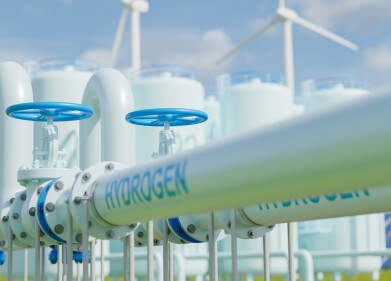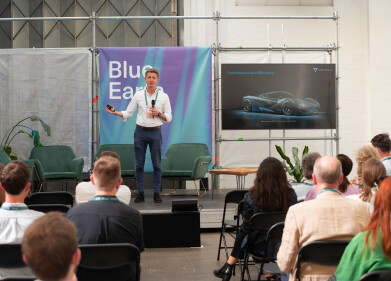Hydrogen fuel
BP bets on green hydrogen as fuel of the future
Aug 22 2023
In the midst of an era where sustainability and energy efficiency are paramount, BP, the British multinational oil and gas giant, is at the forefront of pioneering strategies aimed at transforming the energy landscape. One key aspect of their plans revolves around leveraging hydrogen as a primary fuel source for the future.
Hydrogen, the most abundant element in the universe, holds significant promise as a clean energy source. While most hydrogen is produced via a highly polluting process called grey hydrogen, there are cleaner variants known as blue and green hydrogen. Blue hydrogen is produced by capturing emissions, while green hydrogen is derived from splitting water using renewable-powered electrolysis.
BP is investing heavily in these cleaner hydrogen solutions, as they represent the most viable option to replace traditional carbon-intensive fuels in heavy industries and transport.
The current CEO of BP, Bernard Looney, has been a visionary, committing to reshaping the company's business model and reducing its carbon footprint. Looney's commitment includes focusing on renewables, of which hydrogen is poised to play a starring role.
In the United States, BP is planning a vast low-carbon hydrogen hub around its Whiting, Indiana refinery. This initiative is being led by Tomeka McLeod, BP's newly-appointed head of hydrogen in the country. By 2026-2027, the company plans to replace around 200,000 tonnes of grey hydrogen with blue hydrogen.
BP's restructuring has also led to the formation of a dedicated hydrogen division, encompassing over 150 staff and led by Felipe Arbelaez. The company has already invested in various large-scale hydrogen projects across Australia, Europe, and Britain. Further explorations are underway in Oman and Mauritania.
Governments worldwide are recognizing the importance of hydrogen and offering support to stimulate its growth. For instance, the U.S. government's $430 billion Inflation Reduction Act (IRA) has provisioned considerable incentives for green hydrogen production.
In the UK, BP's green hydrogen project, HyGreen Teesside, has been selected to progress to the next stage of funding by the Department for Energy Security and Net Zero. This project, targeting production by 2026, will be one of the largest green hydrogen facilities in the UK, aiming to produce up to 500 MW by 2030.
BP has not only increased spending on low-carbon hydrogen but has also strategically acquired assets to boost its hydrogen capacity. For example, the acquisition of a 40.5% stake in a 26 gigawatt renewables project in Australia and the development of two projects in Britain demonstrate BP's intent.
Moreover, BP's venture capital arm invested in U.S.-based Advanced Ionics, a start-up working on reducing the production costs of green hydrogen through innovative technology. This investment could be a game-changer in making green hydrogen more competitive against fossil fuels.
Despite the promise and excitement around hydrogen, there are still significant barriers to overcome, primarily its cost of production. However, tax credits, subsidies, and advancements in technology, like those being developed by Advanced Ionics, are expected to make hydrogen more cost-competitive.
Moreover, collaboration with governments and a shared vision among industries is vital to make hydrogen a mainstream energy source. BP's Chief Financial Officer Murray Auchincloss acknowledges that hydrogen's growth is moving at a pace much faster than anticipated, emphasizing that its rapid acceleration will be dependent on cost.
BP's diversified approach in positioning hydrogen as a fuel of the future showcases the company's commitment to a clean energy future. From infrastructural developments to technological advancements and government collaboration, BP is leading the way in the hydrogen landscape.
The energy transition is no longer an option but a necessity. As one of the world's leading oil and gas companies, BP's strategic investments in hydrogen indicate a profound shift in energy thinking and the beginning of a more sustainable and greener future.
Their pioneering efforts, like the planned hydrogen hub in Indiana or the green hydrogen project in Teesside, are not just corporate endeavors but vital components in a global movement towards energy decarbonization.
With planned production scaling up into the hundreds of millions and aiming to capture 10% share of hydrogen in core markets by 2030, BP is firmly placing itself as a global leader in the hydrogen economy. Its commitment to blue and green hydrogen and proactive strategies to overcome challenges stand as a beacon for other companies to follow suit.
The drive towards a hydrogen economy is in full throttle, and BP's investment and innovation in this field send a clear signal: hydrogen is not merely a possibility; it is the fuel of the future.
Digital Edition
PIN 25.6 Buyers' Guide
January 2025
Buyers' Guide Directory - Product Listings by Category - Suppliers Listings (A-Z) Articles Analytical Instrumentation - ASTM D7042: The Quantum Leap in Viscosity Testing Technology -...
View all digital editions
Events
SPE Hydraulic Fracturing Technology Conference and Exhibition
Feb 04 2025 The Woodlands, TX, USA
Feb 05 2025 Guangzhou, China
Trinidad and Tobago Energy Conference 2025
Feb 10 2025 Point Lisas, Trinidad
Feb 11 2025 Lagos, Nigeria
Feb 13 2025 Manama, Bahrain



















